Saturday Feb 21, 2026
Saturday Feb 21, 2026
Saturday, 9 November 2019 00:34 - - {{hitsCtrl.values.hits}}
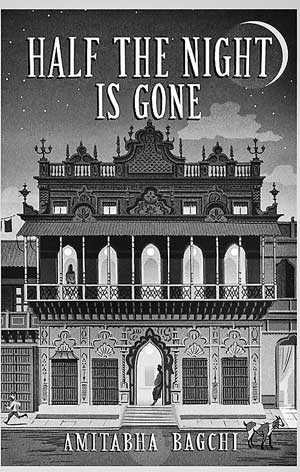
About the Book:
The celebrated Hindi novelist Vishwanath is heartbroken by the recent loss of his son in an accident. The tragedy spurs him to write a novel set in the household of Lala Motichand. It follows the lives of the wealthy lala and his three sons: self-confident Dinanath, the true heir to Motichand’s mercantile temperament; lonely Diwanchand, uninterested in business and steeped in poetry; and illegitimate Makhan Lal, a Marx-loving schoolteacher kept to the periphery of his father’s life. In an illuminating act of self-reflection, Vishwanath, the son of a cook for a rich sethji, also tells the story of the lala’s personal servant, Mange Ram, and his son, Parsadi. Fatherhood, brotherhood and childhood, love, loyalty and poetry – all come to the fore as sons and servants await the lala’s death. By writing about mortality and family, Vishwanath confronts the wreckage of his own life while seeking to make sense of the new India that came into being after independence. Spellbinding and penetrating, Half the Night Is Gone raises questions of religion, literature and society that speak to our fractured times.
About the Author:
Amitabha Bagchi is the author of three novels. The first, Above Average, was a bestseller. His second novel, The Householder, was published to critical acclaim and the third, This Place, was shortlisted for the Raymond Crossword Book Award 2014. Bagchi lives in New Delhi with his wife and son.
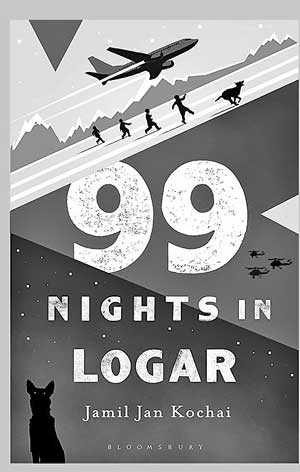 2. 99 Nights in Logar by Jamil Jan Kochai
2. 99 Nights in Logar by Jamil Jan Kochai About the Book:
Laconic, sharp and playful, 99 Nights in Logar is a stunning coming-of-age novel and a portrait of contemporary Afghanistan like no other, blending grit and immediacy with lyrical mythmaking.
It is 2005 in Logar, Afghanistan, and twelve-year-old Marwand has returned from America for the summer. He loses the tip of his finger to Budabash, the family dog, who then escapes. Marwand’s quest to find him over ninety-nine nights begins…
Deeply humorous and surprisingly tender, 99 Nights in Logar is a vibrant exploration of the power of stories – the ones we tell each other, and the ones we find ourselves in.
About the Author:
Jamil Jan Kochai was born in Pakistan and grew up in the United States. He has a master’s in English from UC Davis and is a Truman Capote Fellow at the Iowa Writers’ Workshop. His fiction has appeared, or is forthcoming, in A Public Space, Ploughshares, and The O. Henry Prize Stories. 99 Nights in Logar is his debut novel.
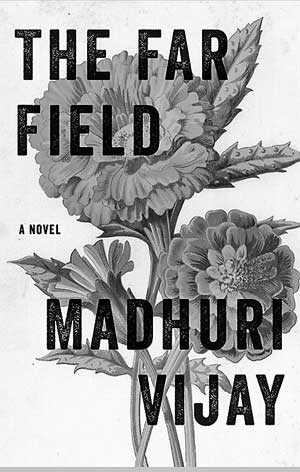
About the Book:
Gorgeously tactile and sweeping in historical and sociopolitical scope, Pushcart Prize-winner Madhuri Vijay’s The Far Field follows a complicated flaneuse across the Indian subcontinent as she reckons with her past, her desires, and the tumultuous present.
In the wake of her mother’s death, Shalini, a privileged and restless young woman from Bangalore, sets out for a remote Himalayan village in the troubled northern region of Kashmir. Certain that the loss of her mother is somehow connected to the decade-old disappearance of Bashir Ahmed, a charming Kashmiri salesman who frequented her childhood home, she is determined to confront him. But upon her arrival, Shalini is brought face to face with Kashmir’s politics, as well as the tangled history of the local family that takes her in. And when life in the village turns volatile and old hatreds threaten to erupt into violence, Shalini finds herself forced to make a series of choices that could hold dangerous repercussions for the very people she has come to love.
With rare acumen and evocative prose, in The Far Field Madhuri Vijay masterfully examines Indian politics, class prejudice, and sexuality through the lens of an outsider, offering a profound meditation on grief, guilt, and the limits of compassion.
About the Author:
Madhuri Vijay is a graduate of the Iowa Writers’ Workshop, where she was an Iowa Arts Fellow and a recipient of the Henfield Prize. Vijay’s writing has received a Pushcart Prize, as well as a 30-Below Prize from Narrative Magazine, and has appeared in Best American Non-Required Reading, Narrative, and Salon, among other publications. Vijay was born in Bangalore. The Far Field is her first book.
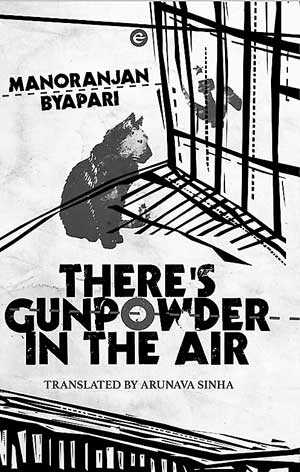 4. There’s Gunpowder in the Air by Manoranjan Byapari
4. There’s Gunpowder in the Air by Manoranjan Byapari About the book:
It’s the early seventies. The Naxalbari Movement is gathering strength in Bengal. Young men and women have left their homes, picked up arms to free land from the clutches of feudal landlords and the state, and return them to oppressed landless farmers. They are being arrested en masse and thrown into high-security jails. In one such jail, five Naxals are meticulously planning a jailbreak. They must free themselves if the revolution is to continue. But petty thief Bhagoban, much too happy to serve frequent terms for free food and shelter, has been planted by Jailor Bireshwar Mukherjee among them as a mole. Only, Bhagoban seems to be warming up to them. There’s Gunpowder in the Air is a searing investigation into what deprivation and isolation can do to human idealism.
About the Author:
He was born in the mid-fifties in Bangladesh. His family migrated to West Bengal when he was three. At 24, he came into contact with the Naxals and famous labour activist Shankar Guha Niyogi, founder of the Chhattisgarh Mukti Morcha at the Dalli Rajhara Mines. He was sent to jail during this time, where he taught himself to read and write. Later, while working as a rickshaw puller in Kolkata, Byapari had a chance meeting with Mahasweta Devi, who urged him to write for her journal Bartika. He has published 10 novels and over 50 short stories since. Until recently he was working as a cook with the Hellen Keller Institute for the Deaf and Blind in West Bengal.
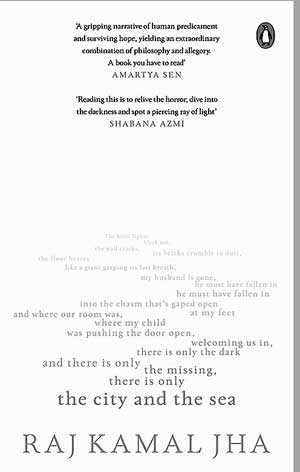
About the Book:
In a crumbling neighbourhood in New Delhi, a child waits for a mother to return home from work. And, in parallel, in a snow-swept town in Germany on the Baltic Sea coast a woman, her memory fading, shows up at a deserted hotel. Worlds apart, both embark, in the course of that night, on harrowing journeys through the lost and the missing, the living and the dead, until they meet in an ending that breaks the heart - and holds the promise putting it back together again.
Called the novelist of the newsroom, Raj Kamal Jha cleaves open India’s tragedy of violence against women with a powerful story about our complicity in the culture that supports it. This is a book about masculinity - damaging and toxic and yet enduring and entrenched - that begs the question: What kind of men are our boys growing up to be?
About the Author:
Raj Kamal Jha is Chief Editor of The Indian Express. The newspaper has won the Vienna-based International Press Institute’s India Award for Excellence in Journalism four times. For the newspaper’s achievement in investigative journalism, Jha was awarded Journalist of the Year at the Red Ink Awards by the Mumbai Press Club in 2017. He got the Distinguished Alumnus Award from Indian Institute of Technology, Kharagpur, for his ‘journalism and fiction that tell stories of a changing India with honesty and courage.’ His fiction has been translated into more than a dozen languages. This is his fifth novel.
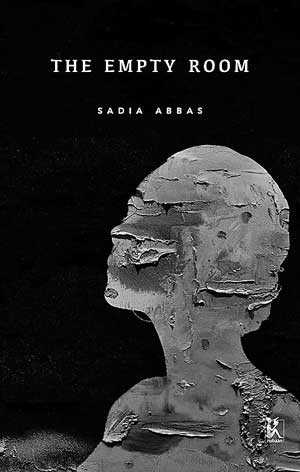 6. The Empty Room by Sadia Abbas
6. The Empty Room by Sadia Abbas About the Book:
In 1970s Karachi, where violence and political and social uncertainty are on the rise, a talented painter, Tahira, tries to hold her life together as it shatters around her. Her marriage is quickly revealed to be a trap from which there appears no escape. Accustomed to the company of her brother Waseem and friends, Andaleep and Safdar, who are activists, writers and thinkers, Tahira struggles to adapt to her new world of stifling conformity and to fight for her identity as a woman and an artist.
Tragedy strikes when her brother and friends are caught up in the cynically repressive regime. Faced with loss and injustice, she embarks upon a series of paintings entitled The Empty Room, filling the blank canvases with vivid colour and light.
Elegant, poetic, and powerful, The Empty Room is an important addition to contemporary Pakistani literature, a moving portrait of life in Karachi at a pivotal moment in the nation’s history, and a powerful meditation on art and the dilemmas faced by women who must find their own creative path in hostile conditions.
About the Author:
Sadia Abbas grew up in Pakistan and Singapore. She received her PhD in English literature from Brown University, and she teaches in the English Department at Rutgers University-Newark. Sadia is Adjunct Professor at the Stavros Niarchos Center for Hellenic Studies at Simon Fraser University. She loves long walks, the Mediterranean and, indiscriminately, all sorts of films.